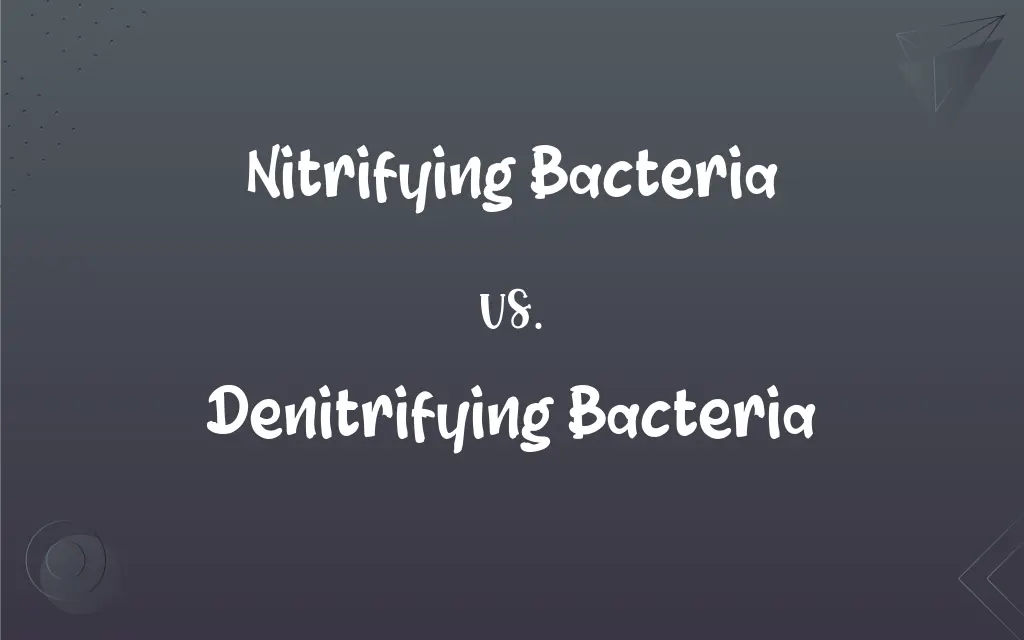Nitrifying Bacteria vs. Denitrifying Bacteria: What's the Difference?
Edited by Aimie Carlson || By Janet White || Published on February 20, 2024
Nitrifying bacteria convert ammonia to nitrate, crucial in the nitrogen cycle, while denitrifying bacteria convert nitrate to nitrogen gas, releasing it into the atmosphere.

Key Differences
Nitrifying bacteria play a critical role in the nitrogen cycle by converting ammonia into nitrite and then nitrate, essential for plant growth. Conversely, denitrifying bacteria reduce nitrate to nitrogen gases, returning nitrogen to the atmosphere, thus balancing the nitrogen cycle.
Found in soil and water, nitrifying bacteria are essential for the health of ecosystems, facilitating the availability of nitrogen to plants. Denitrifying bacteria, also present in these habitats, act oppositely by removing nitrogen from the soil, affecting soil fertility.
Nitrifying bacteria, by oxidizing ammonia, help prevent the accumulation of toxic ammonia levels in the environment. Denitrifying bacteria, on the other hand, play a crucial role in reducing nitrate pollution in water bodies.
Agriculturally, managing nitrifying bacteria is vital for optimizing crop production through effective nitrogen utilization. In contrast, managing denitrifying bacteria is important for controlling nitrogen loss from soils and preventing groundwater contamination.
In wastewater treatment, nitrifying bacteria are used to remove harmful ammonia, improving water quality. Denitrifying bacteria are utilized in the later stages of wastewater treatment to remove excess nitrates, preventing eutrophication in aquatic ecosystems.
ADVERTISEMENT
Comparison Chart
Primary Function
Convert ammonia to nitrite and nitrate
Convert nitrate to nitrogen gas
Role in Nitrogen Cycle
Fix nitrogen into a usable form for plants
Release fixed nitrogen back to the atmosphere
Environmental Impact
Prevent ammonia accumulation
Reduce nitrate pollution
Agricultural Importance
Enhance soil fertility for crops
Control nitrogen loss from soil
Use in Wastewater Treatment
Remove ammonia in early stages
Remove nitrates in later stages
ADVERTISEMENT
Nitrifying Bacteria and Denitrifying Bacteria Definitions
Nitrifying Bacteria
Nitrifying bacteria oxidize ammonia into nitrite and then nitrate.
Nitrifying bacteria in soil convert ammonia from decomposing organic matter into nitrates for plant use.
Denitrifying Bacteria
Denitrifying bacteria help in reducing nitrate pollution in aquatic environments.
In rivers, denitrifying bacteria play a role in preventing algal blooms by reducing nitrate levels.
Nitrifying Bacteria
These bacteria are key in the nitrogen cycle, facilitating nitrogen assimilation in plants.
Nitrifying bacteria help maintain the balance of the nitrogen cycle in agricultural fields.
Denitrifying Bacteria
Denitrifying bacteria aid in controlling soil nitrogen levels.
In agricultural fields, denitrifying bacteria regulate the nitrogen available to crops.
Nitrifying Bacteria
Nitrifying bacteria contribute to soil health and plant growth.
Gardeners often encourage nitrifying bacteria activity to enhance soil fertility.
Denitrifying Bacteria
They are important in wastewater treatment to prevent eutrophication.
Denitrifying bacteria in sewage plants minimize the risk of eutrophication in nearby water bodies.
Nitrifying Bacteria
They are essential in wastewater treatment for ammonia removal.
Nitrifying bacteria in treatment plants oxidize harmful ammonia into less toxic nitrates.
Denitrifying Bacteria
Denitrifying bacteria reduce nitrates to nitrogen gas, releasing it into the atmosphere.
Denitrifying bacteria in wetlands convert nitrates in water to nitrogen gas, purifying the water.
Nitrifying Bacteria
Nitrifying bacteria are crucial in preventing toxic ammonia buildup in ecosystems.
In aquariums, nitrifying bacteria prevent fish toxicity by converting ammonia.
Denitrifying Bacteria
These bacteria are vital in completing the nitrogen cycle by returning nitrogen to the air.
Denitrifying bacteria in soil help balance nitrogen levels by converting excess nitrates to gas.
FAQs
How do denitrifying bacteria affect the nitrogen cycle?
They convert nitrate back into nitrogen gas, completing the cycle.
Can denitrifying bacteria reduce water pollution?
Yes, they help in reducing nitrate pollution in water.
Where are nitrifying bacteria found?
They're commonly found in soil and water bodies.
Are nitrifying bacteria important for plant growth?
Yes, they make nitrogen available in a form that plants can use.
Are denitrifying bacteria used in sewage treatment?
Yes, they remove excess nitrates in later stages of treatment.
How do denitrifying bacteria impact agriculture?
They control nitrogen loss from the soil, affecting soil fertility.
What role do nitrifying bacteria play in wastewater treatment?
They remove ammonia in the early stages of treatment.
What do nitrifying bacteria do?
They convert ammonia into nitrite and then nitrate.
What is the environmental significance of nitrifying bacteria?
They prevent the buildup of toxic ammonia in ecosystems.
Can nitrifying bacteria be used in aquaculture?
Yes, they are crucial in maintaining water quality in fish tanks.
Can denitrifying bacteria be found in all soil types?
They are more common in wet, poorly aerated soils.
How do denitrifying bacteria affect nitrogen availability in soil?
They reduce nitrogen availability by converting nitrates to gases.
Are there any commercial applications for nitrifying bacteria?
Yes, they are used in biofertilizers and wastewater treatment.
Do denitrifying bacteria only work in anaerobic conditions?
Yes, they primarily function in oxygen-limited environments.
Can nitrifying bacteria be harmful?
In excess, they can lead to high nitrate levels, which can be harmful.
Do denitrifying bacteria contribute to global warming?
Indirectly, by releasing nitrogen gases, some of which are greenhouse gases.
How do human activities impact nitrifying and denitrifying bacteria?
Pollution, land use changes, and agricultural practices can affect their populations and activity.
How do nitrifying bacteria contribute to soil health?
By converting ammonia to nitrates, they enhance soil fertility.
What factors affect nitrifying bacteria activity?
Soil pH, temperature, and oxygen availability influence their activity.
Are denitrifying bacteria beneficial for aquatic life?
Yes, they help maintain balanced nitrogen levels in water ecosystems.
About Author
Written by
Janet WhiteJanet White has been an esteemed writer and blogger for Difference Wiki. Holding a Master's degree in Science and Medical Journalism from the prestigious Boston University, she has consistently demonstrated her expertise and passion for her field. When she's not immersed in her work, Janet relishes her time exercising, delving into a good book, and cherishing moments with friends and family.
Edited by
Aimie CarlsonAimie Carlson, holding a master's degree in English literature, is a fervent English language enthusiast. She lends her writing talents to Difference Wiki, a prominent website that specializes in comparisons, offering readers insightful analyses that both captivate and inform.
































































